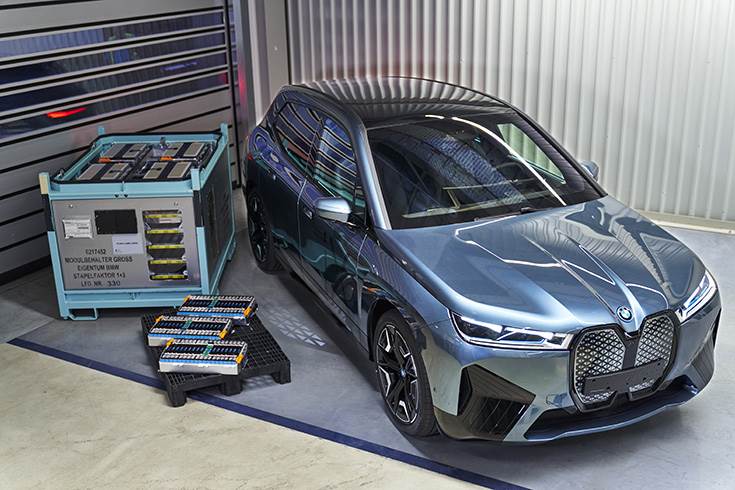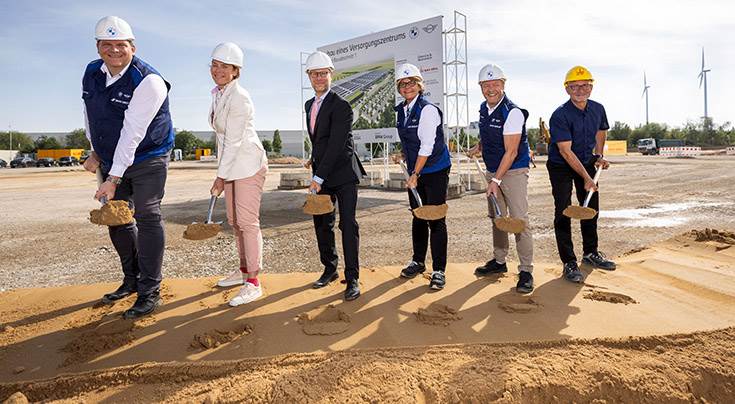The BMW Group continues to invest in e-component production at Plant Leipzig and in the future of the site. A leasehold contract has now been signed for an area of land outside the plant premises, on the northern industrial estate – which is also home to the existing facility.
The new plot for use by BMW consists of 12 hectares in total, eight of which will be built on in the first stage of construction. This will produce a logistics hall for the current fifth-generation high-voltage batteries and an office building, both of which are due to reach completion in mid-2024.
In the first stage of construction, a warehouse, a two-storey office building and a loading tunnel with a combined gross area of 38,000 square metres will be erected. There are also plans for a second construction stage, which will take the total investment to as much as 100 million euros.
 L-R: Frank Hager, Head of Production for High-Voltage Batteries at Plant Leipzig; Anja Hähle-Posselt, Director of the Office for Economic Development of the City of Leipzig, Clemens Schülke, Mayor and Alderman for Business, Labour and Digital in the City of Leipzig, Petra Peterhänsel, Plant Director, Jens Köhler, Works Council Chairman, and Karsten Dickerboom, representing the construction company Max Bögl Stiftung & Co KG.
L-R: Frank Hager, Head of Production for High-Voltage Batteries at Plant Leipzig; Anja Hähle-Posselt, Director of the Office for Economic Development of the City of Leipzig, Clemens Schülke, Mayor and Alderman for Business, Labour and Digital in the City of Leipzig, Petra Peterhänsel, Plant Director, Jens Köhler, Works Council Chairman, and Karsten Dickerboom, representing the construction company Max Bögl Stiftung & Co KG.
Investment in the transition to electromobility
By 2026 the BMW Group aims for at least one in three new cars sold to be fully electric, so the need for high-voltage batteries will increase. Plant Leipzig is already a cornerstone in supplying e-components for the production network and provides one in three battery modules for the BMW Group’s fully electric vehicles.
These include the BMW iX1, the BMW i5 and the BMW iX. With the new hall as a logistics centre for high-voltage batteries, Plant Leipzig is embracing this role even further, with a building that meets all the structural requirements for handling high-voltage components.
Going beyond compliance
Planning the logistics hall, the team applied stringent environmental standards that go above and beyond legal requirements. The buildings will be powered not by fossil fuels, for example. Photovoltaic systems on the roof of the hall will generate approximately 3,000 kW in peak operations. In addition, the hall will be heated by a heat pump. The office building will have a green roof, and trees at strategic points along the façade will keep indoor temperatures cool when the weather outside is hot.
The outside space will be landscaped with over 5,700 new shrubs and trees. This will continue the City of Leipzig and the BMW Group’s efforts to add to the green ring around the plant on the Northern Industrial Estate. Outdoor areas will be illuminated by insect-friendly lights, and parking spaces will be equipped with electric charging points for cars and trucks so that electric heavy goods vehicles can operate between the plant and warehouse.

E-component production
From next year BMW Plant Leipzig will run all three stages of the high-voltage battery production process: cell coating, module production and high-voltage battery assembly. E-component production capacity has been steadily increasing since 2021, and at present battery cells are coated and assembled into modules there. One in three battery modules for fully electric vehicles by the BMW Group already comes from Leipzig today, and a battery assembly system is currently under construction, expected to go on stream early next year. The BMW Group is investing up to 1 billion euros in extending e-component production at Leipzig.
With BMW i3 production now phased out, 2024 will see Plant Leipzig launch its next fully electric model: the new MINI Countryman. The crossover will come with a choice of combustion engines or a fully electric drive, the high-voltage batteries for the latter being made directly in Plant Leipzig’s workshops.
